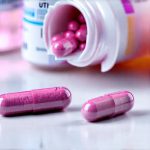Urinary tract infections (UTIs) are incredibly common, particularly among women, causing discomfort and disruption to daily life. While antibiotics are often prescribed – and rightfully so when necessary – many individuals seek complementary strategies to support their body’s natural healing processes after completing a course of antibiotics or for mild UTIs that don’t require immediate medical intervention. The focus here isn’t on treating an active, severe UTI; it’s about bolstering your system to recover and prevent recurrence once you’ve addressed the initial infection with appropriate medical care. Understanding how to gently support bladder health naturally can be a proactive step towards long-term wellbeing.
The aftermath of a UTI, even one successfully treated, can leave the bladder feeling sensitive and irritated. The inflammation doesn’t simply vanish overnight. Antibiotics, while effective at eliminating bacteria, can also disrupt the gut microbiome, potentially impacting overall immune function and leaving you more vulnerable to future infections. Therefore, a holistic approach that focuses on hydration, dietary choices, supportive nutrients, and gentle lifestyle adjustments can significantly aid in recovery and promote bladder resilience. It is crucial to remember that this information should not replace professional medical advice; always consult with your healthcare provider regarding any health concerns or before making changes to your treatment plan.
Hydration & Dietary Support for Bladder Healing
Proper hydration is arguably the most important factor in supporting bladder healing. When you’re adequately hydrated, urine becomes more diluted, which helps flush out remaining bacteria and reduces irritation. Aim for at least eight glasses of water daily, but adjust based on your activity level and climate. Don’t wait until you feel thirsty – sip water consistently throughout the day. Beyond just water, herbal teas like chamomile or dandelion (check with your doctor if you have allergies or are on medications) can contribute to fluid intake while offering additional soothing properties. However, it’s equally important to be mindful of what not to drink. Caffeine, alcohol, and carbonated beverages can irritate the bladder and exacerbate symptoms.
Diet plays a crucial role in minimizing irritation and supporting immune function during recovery. Focus on foods that are gentle on the digestive system and rich in nutrients. Anti-inflammatory foods like berries, leafy greens, and fatty fish (salmon, tuna) can help reduce inflammation within the urinary tract. Consider incorporating probiotics into your diet – either through fermented foods like yogurt or kefir, or a supplement – to restore gut health which impacts overall immunity. Avoid spicy foods, citrus fruits, tomatoes, and artificial sweeteners, as these can sometimes trigger bladder sensitivity in some individuals.
A key aspect of dietary support involves understanding the role of D-mannose. This naturally occurring sugar found in cranberries (and available as a supplement) binds to E. coli bacteria – the most common cause of UTIs – preventing them from adhering to the bladder wall and allowing them to be flushed out with urine. While not a substitute for antibiotics, D-mannose can be a valuable preventative measure after treatment, helping to reduce the risk of recurrence. It’s essential to discuss D-mannose supplementation with your doctor before starting, as it may interact with certain medications or health conditions.
Strengthening Your Immune System
A robust immune system is your body’s first line of defense against infection and crucial for long-term bladder health. Chronic stress significantly weakens the immune response, so incorporating stress management techniques into your daily routine is vital. This could include practices like yoga, meditation, deep breathing exercises, or simply spending time in nature. Prioritize getting 7-8 hours of quality sleep each night as this allows your body to repair and regenerate.
Vitamin C is well known for its immune-boosting properties, supporting the production of white blood cells that fight off infection. While a balanced diet should provide sufficient Vitamin C, supplementation may be considered during recovery, but always within recommended daily allowances. Zinc is another essential mineral for immune function, playing a role in wound healing and cell growth. Good sources include lean meats, poultry, beans, and nuts.
Beyond specific vitamins and minerals, consider the importance of gut health – often referred to as your “second immune system.” A healthy gut microbiome helps regulate inflammation and supports the production of antibodies. Probiotic-rich foods or supplements can help restore balance in the gut after antibiotic use. Maintaining a diverse and thriving gut microbiome is an investment in long-term immunity.
Gentle Lifestyle Adjustments & Bladder Habits
Certain lifestyle choices can significantly impact bladder health and recovery. Avoid harsh soaps, douches, and scented feminine hygiene products, as these can disrupt the natural balance of bacteria in the vaginal area and increase the risk of infection. Always wipe from front to back after using the toilet to prevent bacteria from spreading to the urethra. Wear breathable cotton underwear and avoid tight-fitting clothing that traps moisture.
When it comes to bladder habits, don’t hold your urine for extended periods. Frequent urination helps flush out any remaining bacteria and prevents stagnation. However, avoid “just in case” trips to the bathroom – only go when you genuinely need to. This practice of scheduled voiding can help retrain the bladder and prevent urgency.
Finally, pay attention to your body’s signals. If you experience pain during urination or notice any changes in urine color or odor, consult with your healthcare provider immediately. Early detection and treatment are key to preventing complications and ensuring a full recovery. Remember, supporting your bladder’s healing is an ongoing process that requires consistent effort and mindful self-care.





















